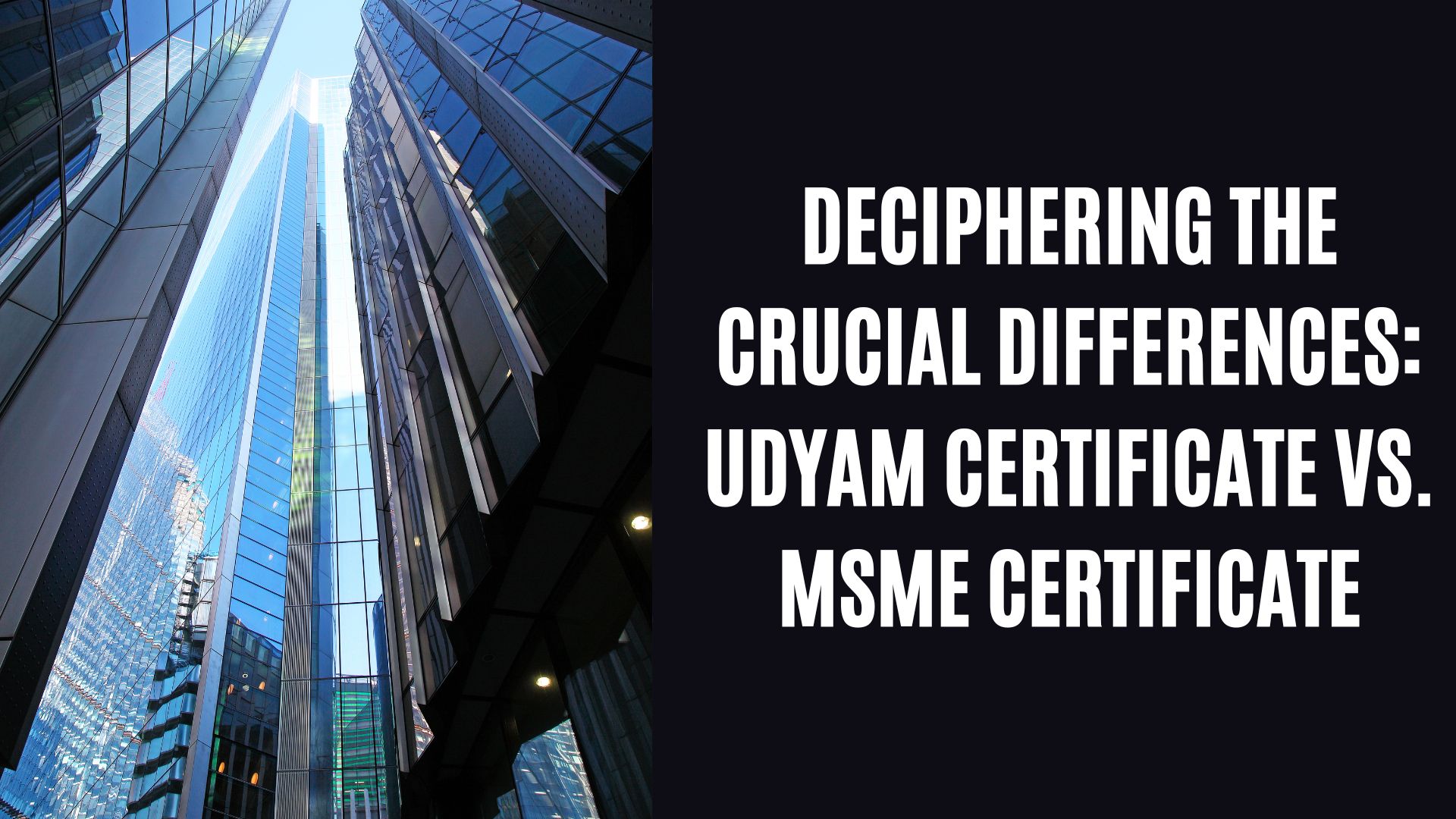In the dynamic landscape of business, especially in countries like India, where small and medium-sized enterprises (SMEs) play a vital role in economic growth, understanding the nuances of government schemes and certifications is paramount. Two certifications that often spark confusion among entrepreneurs are the Udyam Certificate and the MSME Certificate. While both aim to empower small businesses, they differ significantly in their scope, eligibility criteria, and benefits. In this comprehensive analysis, we delve into the critical disparities between the Udyam Certificate and the MSME Certificate, providing clarity to entrepreneurs seeking to leverage government support for their ventures.
Understanding the Udyam Certificate:
The Udyam Certificate, introduced by the Indian government in 2020, replaced the earlier system of MSME registration. It is a digital certificate provided to micro, small, and medium-sized enterprises (MSMEs) based on self-declaration of their existence, investments in plant and machinery or equipment, and turnover. The Udyam Registration Portal facilitates the online registration process for businesses.
Key Features and Benefits:
Ease of Registration:
The Udyam registration process is entirely online, simplifying and expediting the registration procedure for MSMEs.
Classification Based on Investment:
Businesses are classified as micro, small, or medium enterprises based on their investment in plant and machinery or equipment and their turnover.
Financial Assistance:
Udyam-certified businesses are eligible for various government schemes, subsidies, and financial assistance, including priority sector lending, credit guarantee schemes, and concessions in electricity bills.
Market Access and Preferences:
Udyam-certified businesses receive preference in government procurement processes and tenders, fostering market access and growth opportunities.
Deciphering the MSME Certificate:
The MSME Certificate, on the other hand, has been in existence before the Udyam Certificate was introduced. It is a document issued to enterprises that meet the criteria laid down by the Micro, Small, and Medium Enterprises Development (MSMED) Act, 2006. Unlike the Udyam Certificate, the MSME Certificate involves a more elaborate registration process and documentation.
Key Features and Benefits:
Classification Based on Investment:
Similar to the Udyam Certificate, the MSME Certificate classifies businesses based on their investment in plant and machinery or equipment and their turnover.
Registration Process:
Obtaining an MSME Certificate involves filling out an application form, submitting requisite documents such as Aadhar card, business address proof, and other relevant documents, and paying the registration fee.
Financial Assistance:
MSME-certified businesses are also eligible for various government schemes, subsidies, and financial assistance, similar to Udyam-certified businesses.
Market Access and Preferences:
Like Udyam-certified businesses, MSME-certified enterprises enjoy preferential treatment in government procurement processes and tenders.
Crucial Differences:
While both certificates aim to provide support and benefits to small and medium-sized enterprises, several crucial differences set them apart:
Registration Process:
The Udyam Certificate has a simpler and entirely online registration process, whereas obtaining an MSME Certificate involves more paperwork and offline procedures.
Documentation Requirements:
The documentation required for obtaining an MSME Certificate is more extensive compared to the Udyam Certificate, which primarily relies on self-declaration.
Scope of Benefits:
Although both certificates offer similar benefits in terms of financial assistance and market access, the Udyam Certificate may have certain additional benefits due to its newer and more streamlined approach.
Transition Period:
Since the introduction of the Udyam Certificate, there has been a transition period during which existing MSMEs were required to migrate to the new system. Understanding this transition period and compliance requirements is crucial for businesses.
Suggested Read: Udyam Registration for Public Limited Company
Conclusion:
In conclusion, while both the Udyam Certificate and the MSME Certificate aim to support and empower small and medium-sized enterprises, entrepreneurs must understand the crucial differences between them to make informed decisions. The Udyam Certificate offers a more streamlined registration process, primarily based on self-declaration, whereas obtaining an MSME Certificate involves more paperwork and documentation. However, both certificates provide access to government schemes, subsidies, and preferential treatment in procurement processes. By understanding these disparities, entrepreneurs can navigate the complexities of government certifications effectively and leverage the support available to fuel the growth of their businesses.





